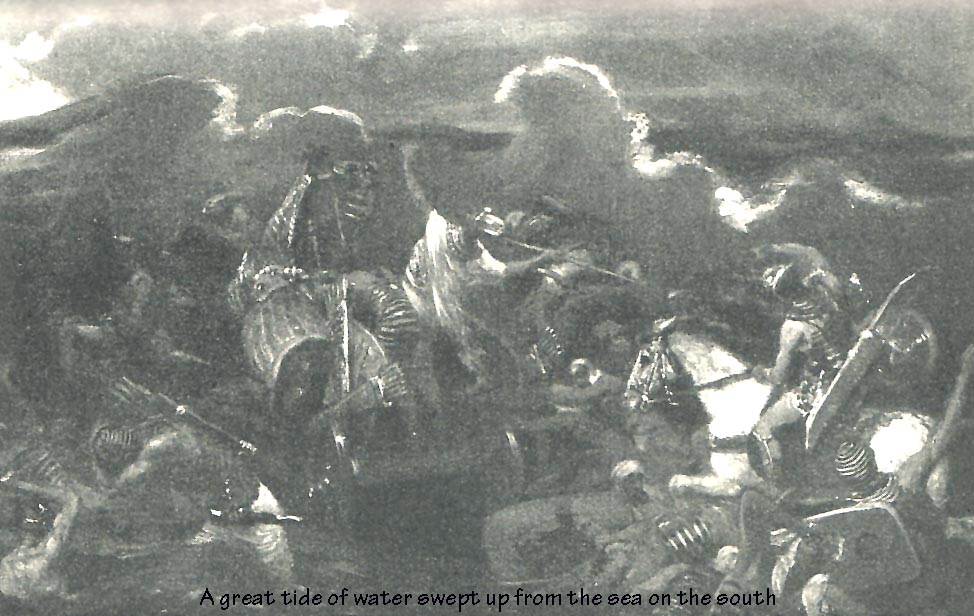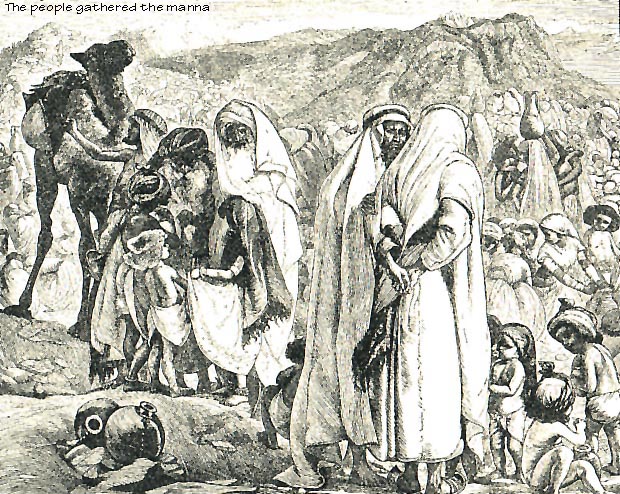
Stories From The Hebrew Bible
HOW THE SEA BECAME DRY AND THE SKY RAINED BREAD

Stories From The Hebrew Bible
HOW THE SEA BECAME DRY AND THE SKY RAINED BREAD
When the children of Israel came out of Egypt, they headed for the land of Canaan. The shortest road was the one following the shore of the Great Sea and entering Canaan on the southwest. But in this region lived the Philistines, a strong and warlike people; and after ages of slavery, the Israelites were not fit to carry on war. The other way was by the southeast, through the desert of Mount Sinai, where Moses had been a shepherd for many years.
So the Israelites, led by the pillar of cloud and fire, turned to the southeast, directly toward the Red Sea, which rolled between them and the desert. In a few days they came to the shore of the sea. The water was before them and mountains on each side.
As soon as the Israelites had left their homes, and were on the march, King Pharaoh was sorry that he had let them go because they were no longer doing his work. God told Moses to turn back and camp between Migdol and the sea, so that Pharaoh would think that the Israelites were lost and confused. Pharaoh called out his army, his chariots, and his horsemen, and followed the Israelites. Soon the army of Egypt was close behind the host of Israel, and the hearts of the people were filled with fear. They cried to Moses, saying: “Why did you bring us out of Egypt to die in this wilderness, with our enemies close behind us? It would have been better to serve the Egyptians.”
“Fear not,” answered Moses. “Stand still and see how God will save you. As for the Egyptians, whom you now see following you, you will see them no more forever. The Lord will fight for you, and you shall stand still and see your enemies slain.”
That night the pillar of fire, which was before the host of Israel, went behind them and stood between the camp of the Egyptians and the camp of the Israelites. To Israel it was bright and dazzling with the glory of the Lord, but to the Egyptians it was dark and terrible; and they dared not enter it.
And all that night there blew over the sea a mighty east wind. It blew so much that the water was blown away; and when the morning came there was a path of dry land between water on one side and water on the other. It was like a road across the sea to the land beyond.
Then Moses told the people to go forward, and the pillar of cloud again went before them; and the people followed. They walked across the Red Sea as on dry land and passed safely over into the wilderness on the other side. So God brought His people out of Egypt into a land that they had never seen.
When the Egyptians saw them marching into the sea, they followed with their chariots and horses. But God made the wheels of their chariots come off and the soldiers cried out: “Let us fly from the face of the Israelites! The Lord is fighting for them and against us!”
Then the waters returned and covered the chariots, the horsemen, and all the army of Pharaoh that came into the sea, and the waters were a wall to them on their right hand and on their left.
Before this happened, all the Israelites had safely passed through the Red Sea. They were now looking at their enemies lying dead on the shore.

Thus Israel saw the great work which the Lord had done in Egypt; so the people feared the Lord, and believed the Lord and His servant Moses.
Moses then sang a song about the great victory God had given them and all the people sang it together. It began like this:
I will sing unto the Lord, for He has triumphed gloriously
The horse and his rider has He thrown into the sea,
The Lord is my strength and song,
And He is become my salvation.
(See Exodus 15 for all the words of this song)
And now the people of Israel were no longer in a level land with fields of grain and abundance of food and streams of water. They were in the great desert, with a rocky path under them, and mountains of rock rising all around. There were only a few springs of water, and they were far apart. Such a large group of men and women and children, with their flocks, would need much water, but they found very little.
They saw in the distance some water and ran to drink of it, for they were very thirsty. But when they tasted the water it was bitter and they could not drink it. Then the people cried to Moses and Moses cried to the Lord. The Lord showed Moses some wood, and he threw it into the water. The water became fresh and pure and good, so the people could drink it. This place they named Marah, a word which means “bitterness,” because of the water they found there.
After passing Marah, they came to a more pleasant place, where they saw twelve springs of fresh water and around them a grove of seventy palm trees. They rested there under the cool shade.
But soon they were in a hot desert of sand which lies between the waters of Elim and Mount Sinai; and again they were in trouble because they had no food for such a large group of people.
Then Moses called upon God, and the Lord said, “I will rain bread from heaven upon you; and you shall go out and gather it every day.”
The next morning when the people looked out of their tents, they saw all around the camp, on the sand, little white flakes, like snow or frost. They had never seen anything like it before and they said, just as we would say, “What is it?”

And Moses said to them, “This is the bread which the Lord has given you to eat. Go out and gather it, as much as you need. But take only as much as you need for today, for it will not keep; and God will give you more tomorrow.”
So the people went out and gathered the manna. They cooked it in various ways, baking it and boiling it. It tasted like wafers flavored with honey. Some took more than they needed, not trusting God’s word that more would be given the next day. But that which was left over spoiled and smelled badly and was useless. This taught the people that each day they should trust God for their daily bread.
But the manna that was left on the ground did not spoil. When the sun came up, it melted away, just like frost or snow-flakes. Before the sixth day of the week came, Moses said to the people: “Tomorrow, on the sixth day of the week, take twice as much manna as usual; for the next day is the Lord’s Sabbath, the day of rest, and the manna will not come on that day.”
So the next morning, like they had done before, all the people went out to gather the manna. On that day, they found that the manna which was not used did not spoil, but stayed fresh until the next morning.
On the Sabbath day, those people who had not gathered enough manna for the Sabbath, went out as they had done before, but found no manna. So that day, these people had nothing to eat. “So the people rested on the seventh day.”
For the forty years that the Israelites lived in the wilderness they ate the manna which God gave them day by day. Not until they reached the border of Canaan, did the manna cease to fall.
Do you remember Who it was, long after this, that said, “I am the bread of life. He that cometh to Me shall never hunger; and he that believeth on Me shall never thirst”? (See John 6:35).